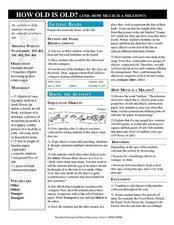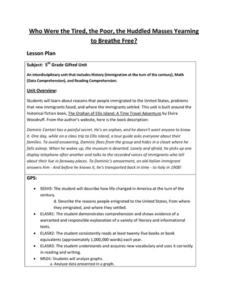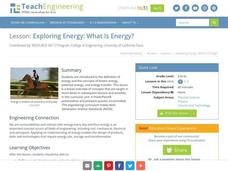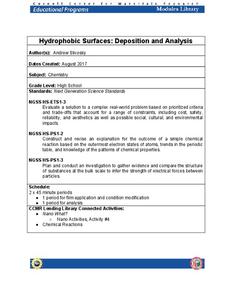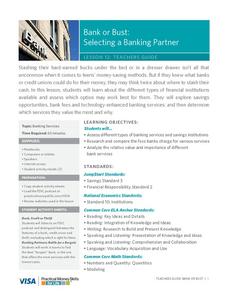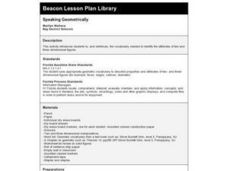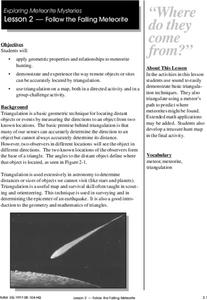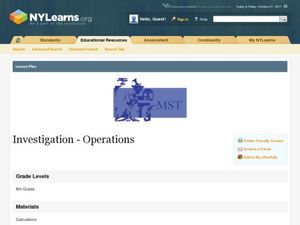Curated OER
Mass, Volume, and Weight
Students explore mass, volume, and weight. In this science and measurement lesson, students compare volume, mass, and weight after listening to the teacher's description of each. Students explore different scales and balances and...
Jordan School District
Picture Frames and Algebra
Middle schoolers create a method for finding the area of a fame for a picture and then transfer their shared methods into algebraic expressions. They develop the algebraic language to communicate and solve problems effectively and...
Desert Discoveries
How Old is Old? (And, How Much is a Million?)
Here is an interesting lesson on how old things are designed for young scientists. In it, learners compile a list of their birthdays, and the class puts them in sequential order from youngest to oldest. Then, they sequence 15 objects...
Curated OER
Mean Absolute Deviation in Dot Plots
The lesson focuses on the ideas of dot plot representations and the mean absolute deviation of data sets.
Northeast Georgia Regional Educational Service Agency
Who Were the Tired, the Poor, the Huddled Masses Yearning to Breathe Free?
Elvira Woodruff's The Orphan of Ellis Island: A Time Travel Adventure is the core text in a interdisciplinary unit study of immigration at the turn of the century.
Teach Engineering
Exploring Energy: What Is Energy?
...Then the water heater exploded like a bomb. Using a video of an exploding water heater, the resource presents the definitions of energy, potential energy, and kinetic energy to be used in later lessons of the unit.
Cornell University
Non-Newtonian Fluids—How Slow Can You Go?
Children enjoy playing with silly putty, but it provides more than just fun. Young scientists make their own silly putty using different recipes. After a bit of fun, they test and graph the viscosity of each.
Cornell University
Hydrophobic Surfaces—Deposition and Analysis
Couches, carpets, and even computer keyboards now advertise they are spill-resistant, but what does that mean? Scholars use physical and chemical methods to coat surfaces with thin films to test their hydrophobic properties. Then they...
Visa
Bank or Bust: Selecting a Banking Partner
Why shouldn't we just save all our money in our mattress? Couldn't our money disappear? Pupils discover the benefits of utilizing banks and credit unions for saving money, as well as how to evaluate different types of...
Teach Engineering
Introduction to Water Chemistry
What are the issues surrounding water quality? Viewers of this short presentation gain information about the importance of clean water, the lack of fresh water, water contamination, and ways that engineers treat water.
PBS
Stories of Painkiller Addiction: Myth or Fact
Are opioids the most abused drug after marijuana? How hard is it for young people to obtain painkillers without a prescription? Middle and high schoolers explore the growing epidemic of opioid addiction with a lesson that prompts them to...
PricewaterhouseCoopers
Risk Management and Insurance: Insurance Costs and Considerations
Compare the different types of insurance with high schoolers, and have them learn the benefits and costs of medical, auto, and home policies. The resource addresses what makes some insurances more costly and what teenagers can do to...
Curated OER
How Far Can a Frog Jump?
Fourth graders are introduced to how to take measurements in the metric system. After defining new vocabulary, they read a story by Mark Twain about jumping frogs. In groups, they simulate a frog jumping contest in which they made...
Curated OER
Speaking Geometrically
Fourth graders are introduced to the vocabulary needed to identify the attributes of two and three-dimensional figures. They work together to create a word wall, which contains the geometric terminology being learned.
Curated OER
Environmental Graphing
Students experiment with graphing. In this graphing introduction lesson, students complete four activities: 1) a bar graph based on class birthdays 2) an estimation graph of the raisins in raisin bread 3) another estimation example with...
Curated OER
Follow The Falling Meteorite
Learners investigate the supposed traveling path of a meteorite. They use sound in order to triangulate the path. The results of the experiment are written on a map to display the path of the meteorite. The culminating activity is when...
Curated OER
Chances Are: Talking Probability
Students explore probability and the process of data analysis and predictions. They participate in two activities, one involving a calculator and one the Internet, in which they make predictions and conduct activities to test their...
Curated OER
Measure Your Body
Students measure their bodies. In this math lesson, students record their height and weight. Students measure themselves in six months and observe any changes.
Curated OER
Geo-Folder
Second graders create a Geo-Folder based on geometric terms and concepts. They make a Table of Contents that guides them through the process of assembling a folder of completed activities.
Curated OER
The Great Chile Challenge
Fifth graders gather data, create a graph, and interpret information. They build vocabulary by negotiating the ideas that go into the graphs which they create. They use Excel to print a variety of graphs based on how much they like Chile...
Curated OER
Geometric Figures
Students identify two and three dimensional shapes and use appropriate geometric vocabulary to write a description of the figure by taking pictures of geometric figures in their own environment.
Curated OER
Anchoring Numbers to Five and Ten
Students complete activities to relate numbers to each other. In this number connection lesson, students count number sets, count forward and backward, and complete other number recognition activities to learn how numbers are related.
Curated OER
Investigation-Operations
Sixth graders explore equations. For this math lesson, 6th graders discuss the rules for solving equations. Students apply the rules and solve various equations.
Alabama Learning Exchange
Is It a Triangle?
Students explore the concept of triangle inequalities. In this triangle inequality lesson, students cut spaghetti noodles into given lengths. Students use the noodles to complete a worksheet about triangle inequalities. ...


